
Raccoon Removal
Raccoon Removal Services in Georgia & Alabama
Raccoon Trapping and Removal
Dealing with a raccoon problem can be quite a nuisance for homeowners. These clever critters often find their way into attics, causing a racket and potentially extensive damage. That’s where our specialized raccoon trapping services come in to ensure the safety and integrity of your home. At Rid-A-Critter, our approach to raccoon removal is not just effective, but also humane, safeguarding your property from unwanted wildlife visitors.
As seasoned professionals in wildlife control, we understand the habits and behaviors of raccoons, which allows us to implement the most effective raccoon traps. Once trapped, raccoons are carefully removed from your property. Our experts don’t just remove the wildlife; we also offer remediation services to repair any damage in your attic and preventative measures to ensure your home remains raccoon-free.
Don’t underestimate a raccoon problem. These animals are persistent and can cause significant damage to your property if not dealt with quickly. Not only are they persistent, but they also pose a health risk as they carry diseases such as rabies. By choosing our professional raccoon removal services, you can trust that the removal process will be conducted with the utmost respect for both the animals and your property.
With Rid-A-Critter’s wildlife services, you’re not just getting a one-time fix. We pride ourselves on offering comprehensive wildlife control solutions. From the moment we set the raccoon trap to the point where the trapped raccoon is removed, we’re dedicated to providing exceptional service. Continual monitoring ensures that your home, especially areas like the attic, remains secure against future invasions.
We don’t just trap; we also teach homeowners about the importance of wildlife prevention. Whether it’s securing potential entry points or advising on habitat modification around your property, our goal is to keep your home, your sanctuary, free from raccoon intrusions. So if you’re dealing with raccoons, don’t hesitate to reach out for proven removal services that prioritize your property’s safety and your peace of mind. Let Rid-A-Critter help you reclaim your home and enjoy a wildlife-free environment.
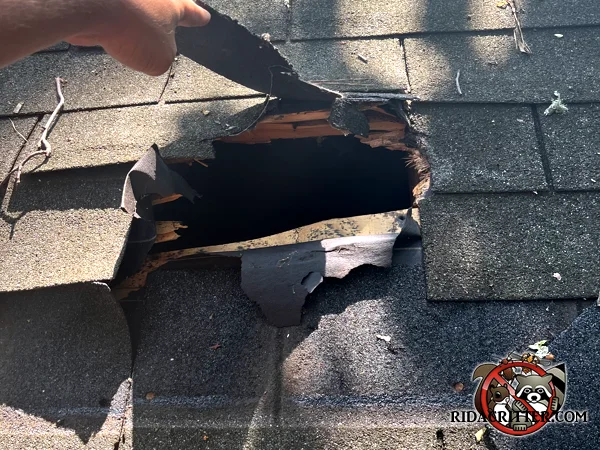
Raccoon control consists of the following:
- Habitat modification, such as removing harborage areas and attractants (for example, unsecured garbage pails).
- Trapping and removing raccoons on your property.
- Repairing raccoon damage
- Keeping raccoons out of your home or building (“raccoon exclusion”).
Ridding your property of raccoons is our mission, and with our experienced team at your service, you can rest assured that the job will be done professionally. Trust in Rid-A-Critter for all your wildlife removal needs and wave goodbye to your raccoon problem for good.
Identifying Signs of Raccoons
Raccoons are one of the most cunning and adaptable wildlife species that can infiltrate our homes and yards, often causing a significant raccoon problem that requires immediate attention. Knowing the signs is essential for swift and effective resolution. Take, for instance, the unmistakable trail of overturned garbage cans; it’s a classic indicator of raccoon activity. But that’s just where it begins. These nocturnal critters are always on the hunt for food, and it’ll often lead them straight to your gardens or inside your home.
However, their search for food is not just limited to the outdoors. Raccoons have earned a reputation for slipping into homes, usually through small openings leading to the attic or basement. It’s in these quiet spaces that they can cause extensive property damage. If you’re hearing unexplained noises or spotting fallen insulation, you may very well be hosting uninvited furry guests. Your attic is an ideal shelter for these creatures, offering warmth and seclusion to raise their young.
The presence of raccoon feces in your yard is a glaring sign that should never be ignored, as it can pose health risks to humans and pets. When it comes to feces, quick and careful clean-up followed by a thorough inspection of your yard and home by a professional is critical.
It’s not just about the signs though; the impact of raccoon damage extends to the very well-being of your home’s structural integrity. These wildlife invaders, with their inquisitive paws and sharp teeth, can wreak havoc on vents, shingles, and even electrical wiring, turning a small raccoon problem into a potential safety hazard. Underestimating the damage of raccoons can be a costly misstep.
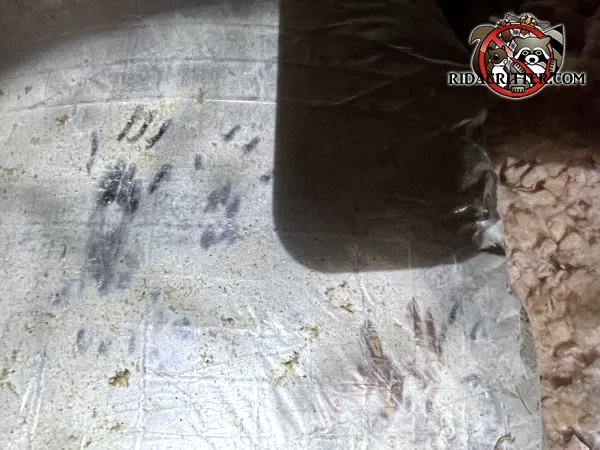
At Rid-A-Critter, understanding these signs is our expertise. We specialize in professional wildlife control and ensure that every raccoon problem in your home or yard is effectively addressed. Our trained specialists are adept at handling these common yet challenging wildlife concerns. They are equipped with humane and efficient methods of raccoon trapping and removal, ensuring that the creatures are safely relocated and your property is safeguarded against future invasions. Be it the attic, basement, or any nook of your home, we’re here to restore peace and protection.
Raccoon Removal and Damage Repair
When it comes to raccoon removal, the experts at Rid-A-Critter understand the nuances of dealing with these intelligent creatures. Raccoons can cause significant damage to your home, which is why it’s crucial to address a raccoon problem swiftly. Our wildlife services include not just removing the raccoons but also repairing the damage they’ve caused. We know that raccoons, once they’ve found a comfortable spot, can be quite persistent. That’s why our removal strategies are developed by experienced professionals who know how to remove raccoons effectively and prevent their return.
Have you heard scratching noises or detected a trapped raccoon in your property? Raccoons are notorious for their intelligence and dexterity, causing a myriad of issues in the areas they inhabit. Restoring your property to its former state post-raccoon invasion is part of our comprehensive raccoon damage repair services. Rid-A-Critter’s philosophy is focused on not only removing wildlife nuisances but also ensuring they don’t come back to disturb your peace and comfort at home.
We don’t just trap raccoons; we find out why they chose your property and implement measures to prevent future incursions. With every raccoon removed, we analyze the situation to ensure an effective solution that keeps your property raccoon-free. Whether raccoons are roaming your attic, garage, or yard, causing damage or unsettling noises, our services are designed to tackle the problem head-on. We’re committed to returning your home to a safe and serene environment.
Understanding the behavior of raccoons and the risks they pose is a vital part of our wildlife control approach.
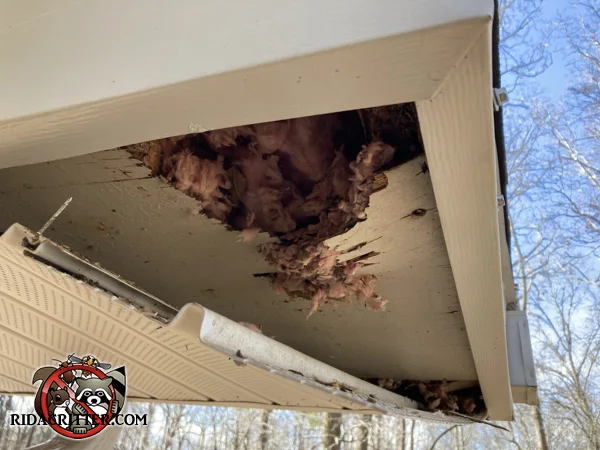
When you choose Rid-A-Critter for your wildlife removal needs, you’re getting more than just a service—you’re securing a team dedicated to the safety and integrity of your home. Our goal is to swiftly remove and control the troublesome raccoons, ensuring minimal disruption to your day-to-day life and maximizing the comfort of your living space once again.
At Rid-A-Critter, we pride ourselves on providing humane and high-quality wildlife control services. No challenge is too great, be it removing a single raccoon or addressing an entire family of raccoons. We use safe and humane methods to both remove the wildlife and repair any damage inflicted. Trust us to protect your property and keep your home the sanctuary it’s meant to be.
Home Repair to Prevent the Return of Raccoons
Ensuring your home remains raccoon-free after a professional wildlife control intervention requires meticulous home repair and exclusion strategies. At Rid-A-Critter, we understand that effective raccoon removal extends beyond simply trapping and removing these clever creatures from your property; it’s about securing your home against future invasions. Raccoons are notorious for finding their way back to comfortable habitats, so our team emphasizes preventative measures as part of our comprehensive raccoon removal services.
Our wildlife experts thoroughly assess the damage caused by raccoons to structures on your property and craft a tailored plan that addresses all points of entry. By implementing sturdy repairs and exclusion techniques, we can prevent the recurrence of wildlife issues. Our exclusion solutions are designed not just to remove raccoons but to deter them from attempting to re-enter. We reinforce common entry points such as soffits, vents, and chimneys, safeguarding your property against future damages.
Raccoon prevention at your home goes hand in hand with professional removal and repair services. After successfully removing raccoons, our specialists repair any damage they’ve caused, restoring your home to its pre-invasion condition. Home repairs can include replacing chewed wiring, patching holes in your roof or siding, and fortifying weak structural points to ensure raccoons can’t gain access again.
We use materials and methods that are both effective and aesthetic, so your home stays secure and looks great. Comprehensive damage repair conducted by Rid-A-Critter doesn’t just return your home to normal; it upgrades your defenses against wildlife intruders.
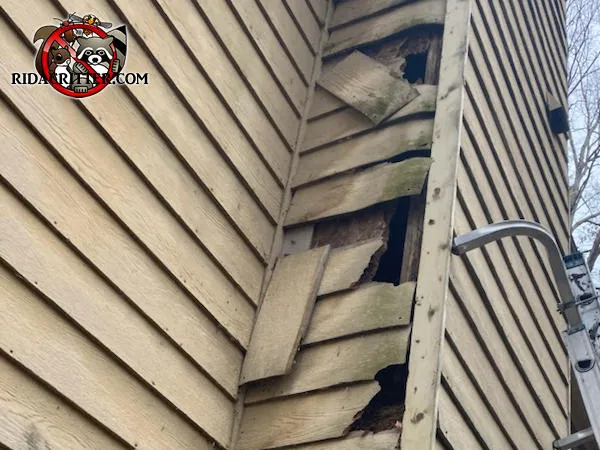
Regular property inspections play a vital role in prevention, and our team can provide these services to keep raccoons at bay. By remaining vigilant and proactive, we can identify potential vulnerabilities and address them promptly. With Rid-A-Critter’s removal and exclusion expertise, you can rest assured that your home is protected against the pesky return of raccoons. Trust us to provide you with the peace of mind that comes from knowing your property is secure from wildlife.
Humane Raccoon Trapping Techniques for Effective Removal
When it comes to expert raccoon trapping services, Rid-A-Critter is committed to employing humane techniques to resolve any raccoon problem you might be facing. Our experienced specialists understand the behaviors of raccoons, ensuring that every trapped raccoon is removed from your home with utmost care. Our services extend from setting up the raccoon trap in strategic places like the attic to repairing any damage they have caused.
Our team is well equipped with the tools necessary for safe raccoon removal, always considering the safety of both the wildlife and the homeowners. In the case of baby raccoons, we take extra precautions to remove these vulnerable animals gently and reunite them with their mother upon relocation. We recognize the repetitive nature of wildlife issues and we ensure steps are taken to prevent the return of pests.
Implementing humane techniques is at the forefront of our raccoon trapping and removal process. We avoid harm and stress to the animals, instead focusing on smart, effective strategies that align with our mission and your need for a wildlife-free home. Our goal is to alleviate your worries about these nocturnal visitors. When you encounter a raccoon problem, it’s crucial to have professionals handle the situation, as raccoons can be unpredictable and potentially dangerous.
At Rid-A-Critter, we’re here to assist you with every step, from identifying signs of raccoons to repairing the damage caused by these uninvited guests. With an emphasis on removal services that respect the well-being of the animals and the peace of your home, you can trust us to remove these critters efficiently. Remember, a home is a sanctuary, and maintaining that sanctuary means ensuring that animals, particularly nuisance wildlife, are expertly and compassionately handled.
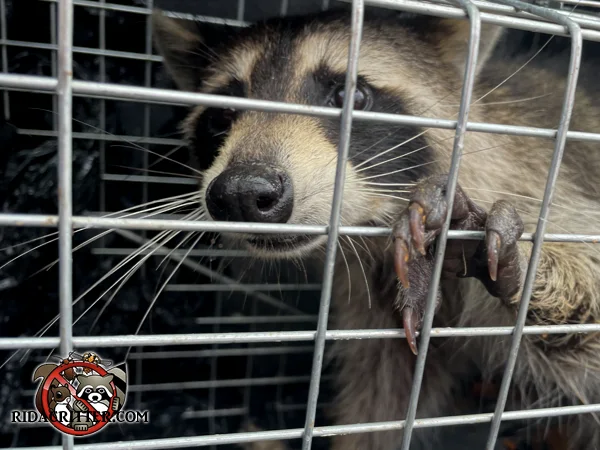
Comprehensive Raccoon Removal and Wildlife Solutions
When it comes to raccoon problems, it’s important to have a comprehensive plan in place for prompt and effective removal. Here at Rid-A-Critter, we understand wildlife infestation and specialize in solutions that not only remove unwanted raccoons but also focus on the welfare of the animals and your property. With our extensive knowledge of raccoon behavior and habitation, our services are designed to tackle even the most challenging raccoon situations.
Our team uses humane trapping techniques to ensure the safe capture and removal of these clever critters from your home or business. We recognize the importance of addressing the raccoon problem as quickly as possible to avoid structural damage and the potential health risks associated with wildlife infestations. With years of experience under our belts, we’ve refined our raccoon removal services to be non-disruptive and thorough, ensuring that raccoons are safely removed from the premises.
After we have removed the pesky wildlife, our control methods extend to prevention. To protect your property from future invasions, we conduct detailed home repairs that fortify your space against the return of raccoons. We seal entry points, reinforce common access areas, and provide advice for maintaining a raccoon-free environment. Our solutions are not only about removal but sustaining a long-term wildlife control strategy. It’s about creating a safe, harmonious space where raccoons and humans don’t have to come into conflict.
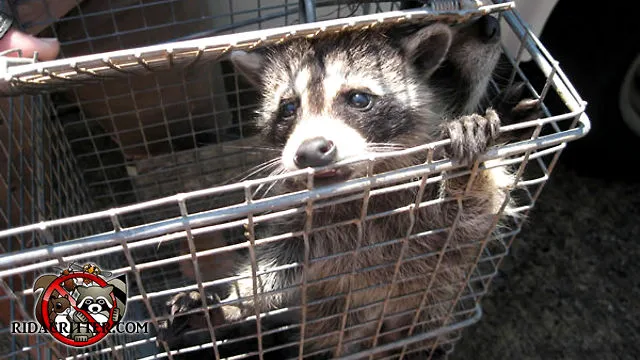
Rid-A-Critter is committed to delivering quality raccoon removal services while being mindful of the welfare of the wildlife we encounter. Whether it’s raccoons or any other uninvited guests, we are equipped to handle all sorts of wildlife infestations. If you spot signs of raccoons, don’t try to tackle the problem alone. Instead, trust in our comprehensive wildlife control solutions for professional servicing. We’ll ensure that your raccoon issue is managed effectively, with care and expertise, to restore peace to your environment.
Remember: raccoons are very strong, powerful wild animals who are prone to rabies and can become very aggressive when they feel threatened. An attack by a raccoon — or even a scratch or a drop of saliva on your skin — can be life-threatening, making raccoon control far too dangerous for untrained individuals. So be safe. Leave raccoon control to the professional animal control technicians at Rid-A-Critter.
With offices throughout Georgia & Alabama and our extended service area, Rid-A-Critter has the tools and personnel to handle any raccoon removal or damage repair job. Contact us today to schedule a consultation.
